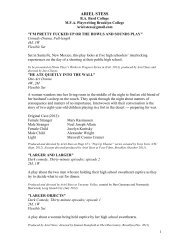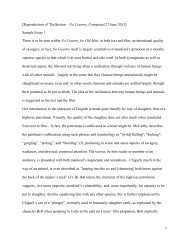Redressing Oscar: Performance and the Trials of Oscar ... - A Stess
Redressing Oscar: Performance and the Trials of Oscar ... - A Stess
Redressing Oscar: Performance and the Trials of Oscar ... - A Stess
You also want an ePaper? Increase the reach of your titles
YUMPU automatically turns print PDFs into web optimized ePapers that Google loves.
chinery, <strong>and</strong> to resolve certain kinds <strong>of</strong> crisis, to <strong>the</strong> performance <strong>of</strong><br />
public ritual. Such ritual involves a "sacrifice," literal or moral, a victim<br />
as scapegoat for <strong>the</strong> group's "sin" <strong>of</strong> redressive violence. (1982:70-71)<br />
The juridical proceedings in <strong>the</strong> spring <strong>of</strong> 1895 began <strong>the</strong> marshaling <strong>of</strong> widespread<br />
cultural forces intent on mending <strong>the</strong> breach in <strong>the</strong> patriarchy caused by<br />
Wilde's public posturing. This essay, based on an underst<strong>and</strong>ing <strong>of</strong> <strong>the</strong> trials as<br />
social drama, examines how Wilde became <strong>the</strong> scapegoat forfin de siecle Britain,<br />
recharacterizes <strong>the</strong> effigy <strong>the</strong> trials construct, <strong>and</strong>, finally, <strong>of</strong>fers an alternativehopefully<br />
broader-interpretation <strong>of</strong> <strong>the</strong> nature <strong>of</strong> <strong>the</strong> breach, one that bears an<br />
underst<strong>and</strong>ing <strong>of</strong> performance linked to <strong>the</strong> popular reception <strong>of</strong> Wilde's aes<strong>the</strong>tic<br />
<strong>the</strong>ories. The intent is to foster a deeper underst<strong>and</strong>ing <strong>of</strong> <strong>the</strong> trials as an<br />
act <strong>of</strong> sacrifice within a rigid patriarchal culture <strong>and</strong> to allow a richer explanation<br />
<strong>of</strong> <strong>the</strong>ir widespread cultural impact. One hundred years after <strong>the</strong> trials, it is time<br />
to reevaluate <strong>the</strong> character that emerged from <strong>the</strong>m. Because, like it or not, that<br />
character produced a distinctly queer identity for succeeding generations <strong>of</strong> gay<br />
men. Just what have <strong>the</strong>y been playing out, <strong>and</strong> who wrote <strong>the</strong> script?<br />
Briefly, <strong>the</strong> facts are as follows: On <strong>the</strong> 28th <strong>of</strong> February 1895 Wilde re-<br />
ceived <strong>the</strong> card that John Sholto Douglas, <strong>the</strong> 8th Marquess <strong>of</strong> Queensberry,<br />
had left for him at Wilde's club, <strong>the</strong> Albermarle, ten days earlier. The card, al-<br />
most illegible because <strong>of</strong> <strong>the</strong> Marquess' h<strong>and</strong>writing, read "To <strong>Oscar</strong> Wilde<br />
posing Somdomite [sic]" <strong>and</strong> was only <strong>the</strong> latest incident in over nine months<br />
<strong>of</strong> aggressive harassment <strong>of</strong> Wilde by <strong>the</strong> fa<strong>the</strong>r <strong>of</strong> his lover Alfred, Lord Dou-<br />
glas. Strongly encouraged by "Bosie," as <strong>the</strong> young Lord Douglas was called,<br />
Wilde brought a suit <strong>of</strong> libel against <strong>the</strong> Marquess. During March <strong>of</strong> 1895 <strong>the</strong><br />
newspapers began fueling interest in this match between two notorious celeb-<br />
rities-as <strong>the</strong> Marquess was not without his own reputation as a belligerent,<br />
nonconforming aristocrat-so that <strong>the</strong> public was properly piqued by 3 April<br />
1895, <strong>the</strong> day <strong>of</strong> <strong>the</strong> first trial.<br />
Though Wilde was <strong>the</strong> prosecutor, it quickly became evident that he was <strong>the</strong><br />
one on trial, not, as Wilde had intended, <strong>the</strong> raving aristocrat. The libel trial<br />
lasted three days <strong>and</strong> contained perhaps <strong>the</strong> most famous cross-examination<br />
scenes <strong>of</strong> any trial, pitting Wilde against Edward Carson, counsel for<br />
Queensberry, in a brilliant battle <strong>of</strong> wits. During <strong>the</strong> morning <strong>of</strong> <strong>the</strong> third day,<br />
5 April, when <strong>the</strong> counsel for <strong>the</strong> defense was beginning its case, counsel for<br />
Wilde, Sir Edward Clarke, on Wilde's behalf <strong>and</strong> with his consent, urged <strong>the</strong><br />
court to enter a plea <strong>of</strong>"not guilty" for Queensberry, admitting that <strong>the</strong> charge<br />
<strong>of</strong> "posing" was correct, <strong>and</strong> thus preventing <strong>the</strong> introduction <strong>of</strong> testimony<br />
from <strong>the</strong> youths Wilde was to have solicited. Queensberry, however, for-<br />
warded to <strong>the</strong> authorities <strong>the</strong> evidence that he had at great pains acquired, <strong>and</strong><br />
later that evening Wilde was arrested at <strong>the</strong> Cadogan Hotel on Sloane Street.<br />
Denied bail, Wilde remained in Holloway prison until his criminal trial be-<br />
gan on <strong>the</strong> 26th <strong>of</strong> April. St<strong>and</strong>ing trial with Wilde was Alfred Taylor, whose<br />
rooms at 13 Little College Street in Westminster served as a sort <strong>of</strong> bro<strong>the</strong>l<br />
<strong>and</strong> social club where youths <strong>and</strong> <strong>the</strong>ir johns could mix. Wilde <strong>and</strong> Taylor<br />
were charged with indecency performed with o<strong>the</strong>r male persons <strong>and</strong> with<br />
conspiring with each o<strong>the</strong>r to commit indecent acts, implicitly sodomy. Seven<br />
days later, on <strong>the</strong> Ist <strong>of</strong> May, <strong>the</strong> jury could not reach a full consensus-most<br />
likely because <strong>of</strong> <strong>the</strong> legal technicalities <strong>of</strong> <strong>the</strong> conspiracy charge, which was<br />
eventually dropped, <strong>and</strong> <strong>the</strong> unreliability <strong>of</strong> several prosecution witnesses. The<br />
trial ended without a conviction.<br />
Released on bail, Wilde waited for his next trial, not to begin until <strong>the</strong> next<br />
criminal court sessions on <strong>the</strong> 20th <strong>of</strong> May. Again Wilde was committed with<br />
<strong>Oscar</strong> Wilde <strong>Trials</strong> 39




